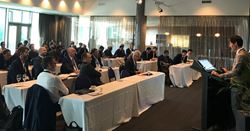News from Asia and the Pacific
IMF-RBNZ Co-host Regional Conference on Inflation Targeting in New Zealand

About 100 experts from central banks, think-tanks and government offices around the Asia-Pacific region got together to discuss broad issues around monetary policy, labor market and the future of inflation targeting for the next two days. A key note speech by Mary Daly, President and CEO of the Federal Reserve Bank of San Francisco, will be live-streamed tomorrow at 9:30 am (GMT +12) here.
Opening Remarks by Chikahisa Sumi, Director of the Regional Office for Asia and the Pacific, IMF
August 28, 2019
AS PREPARED FOR DELIVERY
[1. Introduction]
Governors, Distinguished Guests, Ladies and Gentlemen,
It is my immense pleasure to be here in Wellington today and to welcome you to our Conference on the Prospects and Challenges of Inflation Targeting.
This is a joint RBNZ / IMF event, and I feel privileged that my office, the IMF’s Regional Office for Asia and the Pacific, has been able to contribute to its organization and financing. We focused particularly on broad participation from emerging market economies. This will help ensure that the important insights that this conference will deliver reflect a broader perspective and will be widely disseminated.
[2. Importance of the Conference]
This conference certainly happens in the right place, at the right time, and with the right participants.
(1) What would be a better place than Wellington to discuss inflation targeting?
As Assistant Governor Christian Hawkesby already mentioned, New Zealand pioneered inflation targeting around three decades ago. Since then, this way of conducting monetary policy, together with greater central bank independence, has conquered the central banking world – both in advanced and emerging economies. Three decades later, New Zealand has again been among the pioneers in re-examining the inflation targeting paradigm and reforming its monetary policy framework.
(2) The conference also takes place at the right time. Since the GFC, the global economic environment has changed fundamentally, and so have views on macroeconomic and monetary policy and inflation targeting. And we are still in the process of drawing the lessons.
In advanced economies, central banks have added unconventional instruments to their monetary policy toolkit. Moreover, these instruments have stayed in place longer than most initially thought, and some of these instruments may well become conventional going forward.
Following the RBNZ, many central banks in advanced economies are currently re-considering their monetary policy frameworks, including their mandate, objectives, and targets. This discussion takes place against the backdrop of persistently low inflation and inflation expectations, weak wage-price dynamics, sluggish productivity growth, and lower equilibrium interest rates.
In emerging economies, the debate about monetary policy frameworks has intensified as well. This is happening in an arguably even more challenging environment, characterized by high volatility of capital flows and exchange rates. The latter accentuates the debate about the role that monetary policy should play, together with other tools such as macroprudential policies, in stabilizing the economy and the financial system in an integrated policy framework.
(3) We certainly have the right people here today to advance the discussion on these issues – indeed a high-caliber mix of academics and practitioners. Let me convey my deep appreciation to all our speakers, discussants, and panelists for accepting our invitations. Let me also express my gratitude to our co-organizer, the Reserve Bank of New Zealand and the RBNZ team, for the excellent cooperation with my office in preparing this event.
[3. Short Roadmap and Conclusion]
Today, we will start our program with a keynote speech by Jinill Kim from Korea University about central bank mandates, followed by sessions on wage and price inflation, monetary policy modelling, and interactions between monetary and fiscal policy.
Tomorrow, we will have a second key note speech by Mary Daly of the Federal Reserve Bank of San Francisco on labor markets, and a session with two papers on Japan’s experience with inflation forecasts and expectations.
We can also look forward to two panels at the end of our program:
The first panel will debate the lessons from our conference for the design and conduct of monetary policy, focusing on whether the standard inflation targeting framework remains adequate and what adjustments may be necessary.
The second panel will devote itself to issues of central bank governance and independence in a context where persistent inflation undershooting may have dented central bank credibility and at the same time central banks may be tasked with additional mandates.
RBNZ Deputy Governor Geoff Bascand will deliver the closing comments for the conference.
I look forward to stimulating discussions, and I would like to encourage the audience to actively participate. This is the highest reward you all can give to us who have organized this event.
Let us now please start with session one.


